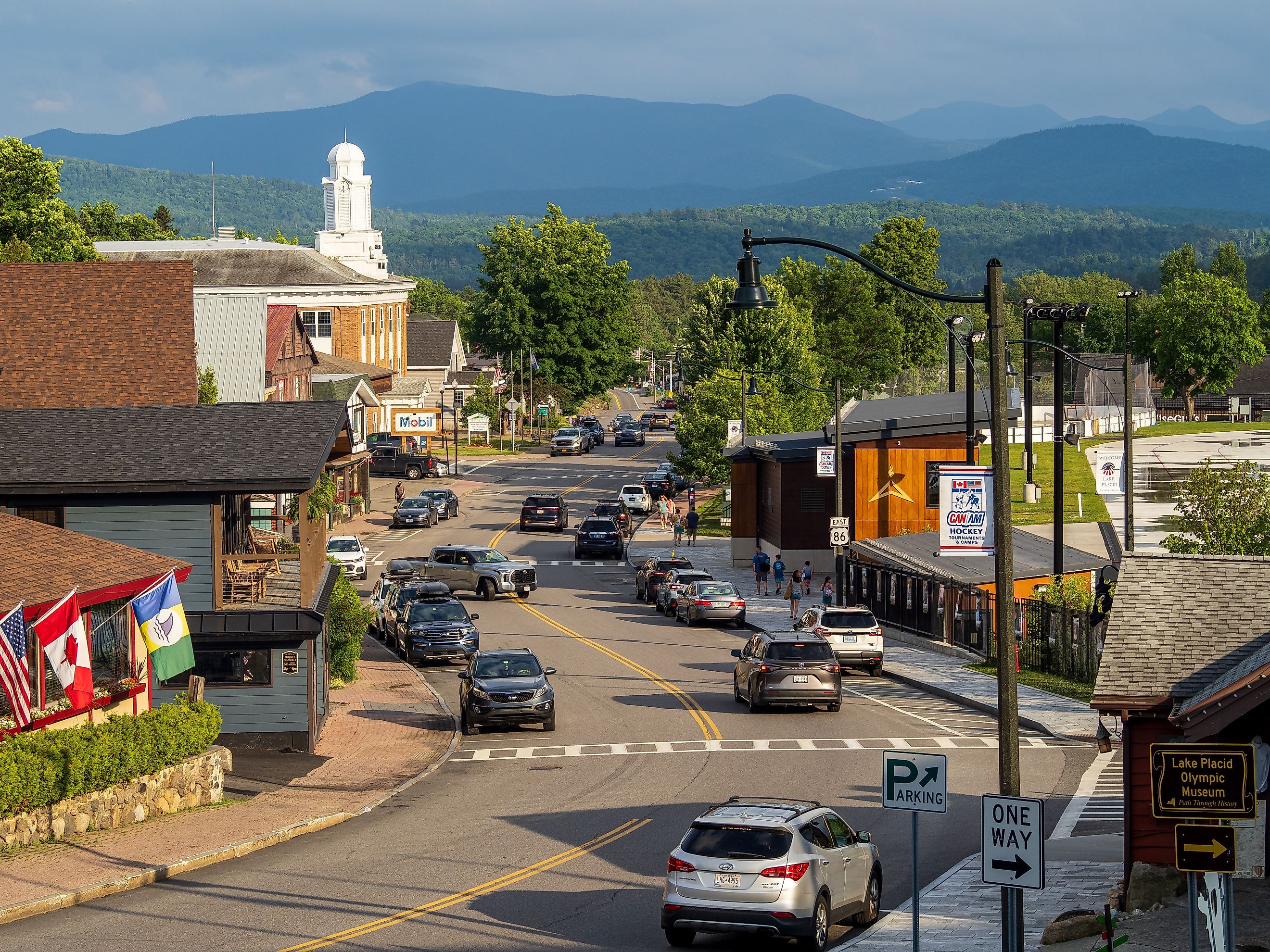
8 Old-World Towns To Visit In The Adirondack Mountains
Nestled in northeastern New York, the Adirondack Mountains are home to some quaint, charming, old-world towns. From impressive main streets lined with trees and historic architecture to quiet, idyllic lakeside locales, these towns invite travelers to step back in time. Whether you prefer exploring vintage shops, savoring a quiet stroll by the lake, or experiencing the hospitality of a tight-knit community, these towns will not disappoint. Combining natural beauty with heritage, these old-world towns are filled with unchanging destinations promising visitors a memorable escape.
Ticonderoga
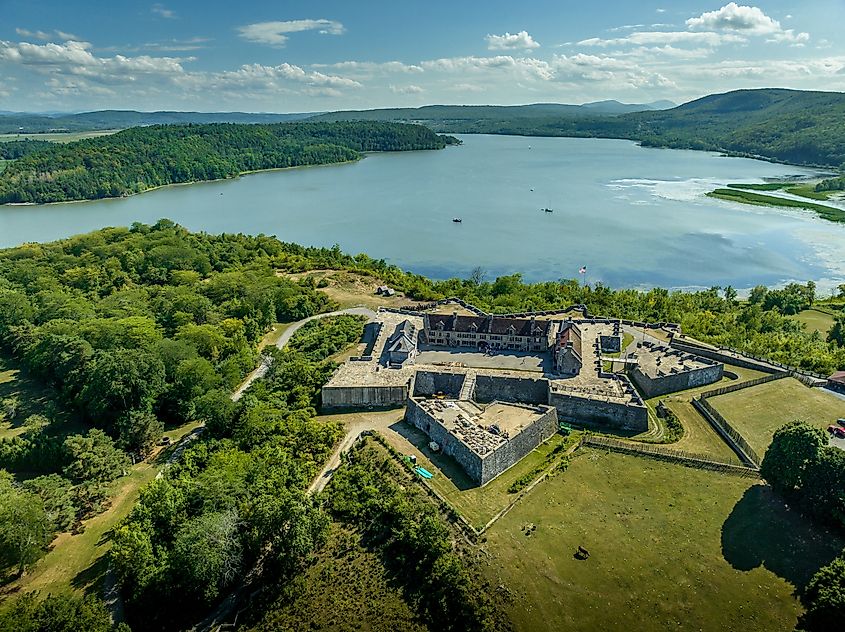
Situated where Lake Champlain and Lake George meet, Ticonderoga is a town completely within the Adirondack Park. About a third of the town's land area is part of the State Forest Preserve. The town's population is at its peak during the summer months as those with vacation homes come to enjoy the town's mountain and lake splendor.
In addition to being a beautiful community, Ticonderoga holds an important place in history. With a name derived from the Algonquin and Iroquois tribes meaning "the place between two waters," Ticonderoga was first settled in 1764 around Fort Ticonderoga. Later, in May 1775, when the American forces captured Fort Ticonderoga, it was a significant event as it was the Americans' first victory. It also secured a tactical advantage with a pathway to Canada. Visitors today can tour the fort and experience a variety of educational programs, tours, and exhibits.
Ticonderoga is surrounded by the Adirondack Mountains and the Green Mountains of Vermont to the south. The Adirondack Park, in which the town is included, is the largest publicly protected area in the US, encompassing six million acres, 3,000 lakes, 30,000 miles of streams and rivers, and habitats including wetlands and forests. The park is a mixture of public and private lands. New York State owns 44% of the park; the rest is privately owned.
Plattsburgh
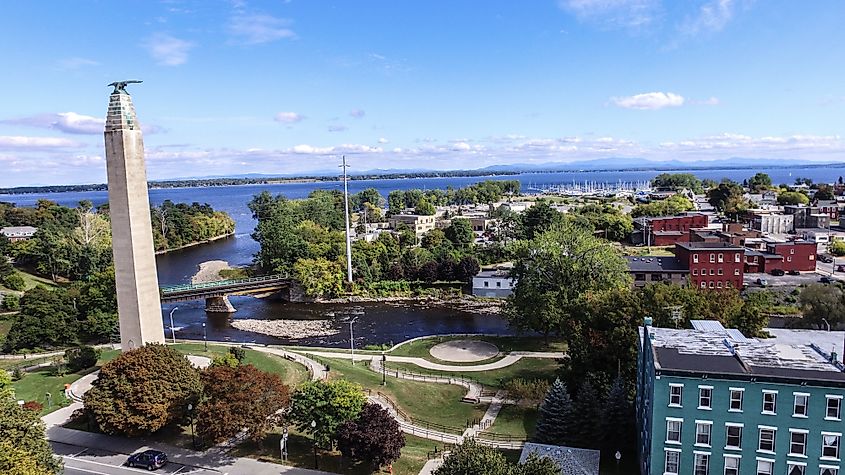
Located on Lake Champlain, the city of Plattsburgh has a population of around 20,000. Just 30 minutes south of the Canadian border, the Saranac River also runs through Plattsburgh. The lake on which the town sits offers tourists opportunities for water sports and fishing, and the nearby Adirondack Mountains provide hiking trails, camping areas, and plenty to explore.
Known as one of the most historic towns in the Adirondacks, Plattsburgh was the site of the Battle of Plattsburgh in the War of 1812. The Kent-Delord House Museum in Plattsburgh, the oldest house in the town, was built in 1797 and provides visitors with information about this war. The house can be toured as you learn what life there was like in the 1800s.
The Battle of Plattsburgh Museum tells the story of the British invasion in 1814, the largest invasion in US history. The Macdonough Monument, located downtown, is a memorial that celebrates Commander Thomas Macdonough's victory in the Battle of Plattsburgh and the Battle of Lake Champlain.
Lake Placid
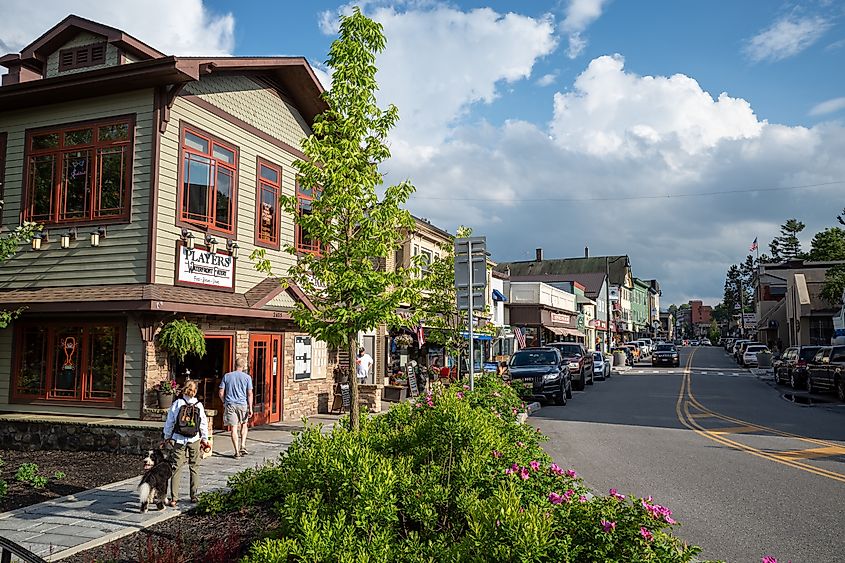
Lake Placid is a popular winter destination for tourists. Its downtown area features a Main Street filled with shops and eateries, just as you would expect in a small town. However, there is more associated with Lake Placid than just winter fun.
Although John Brown's name is usually associated with Harpers Ferry, Virginia, where he was captured and ultimately executed, he actually lived in the Adirondacks. Visit the John Brown State Historic Site to learn more about the famous abolitionist who once called Lake Placid home.
Lake Placid is also famous for its Olympic history, as the 1932 and 1980 Winter Olympics were held there. The Lake Placid Olympic Museum displays exhibits on both of these and offers interactive experiences for visitors.
Hikers will enjoy the Adirondack High Peaks, 46 peaks that are each over 4,000 feet high, with the majority found in the Lake Placid area. Trails exist on each peak, but it is not recommended to attempt to climb more than two or three per day.
Saranac Lake
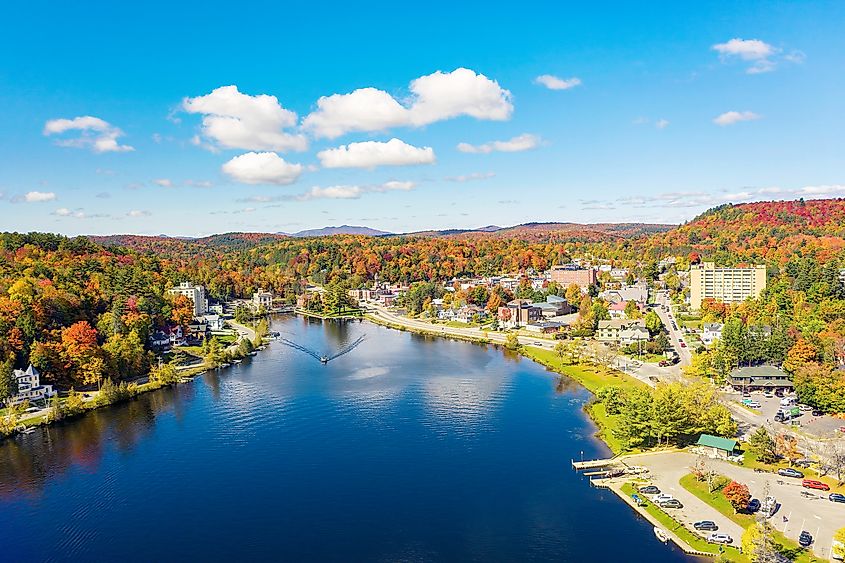
The town of Saranac Lake, with a population of just under 4,900, was settled in 1819. It has an interesting and rich history, including the opening of the first hotel in 1859 by Paul Smith, with Theodore Roosevelt as an early guest. Today, the hotel area has been replaced by Paul Smith's College, a private, non-profit institution offering degrees in forestry, ecology, natural resources, the culinary arts, and hospitality.
In 1827, the Saranac River was dammed to create Lake Flower, which today is popular with fishers, paddleboaters, canoers, and kayakers. It can be found at the center of Saranac Lake's downtown area and offers picturesque views of the town and the Adirondack Mountains.
Saranac Lake is often associated with tuberculosis sanitoriums. The first successful tuberculosis sanitorium was opened in the 1870s in Saranac Lake, and the town became known as a place for healing. Patients who had TB came to Saranac Lake for fresh mountain air, away from the pollution of the city. Visit the Saranac Laboratory Museum to learn more about this important period in the town's history. It also features exhibits on the history and art of Saranac Lake.
Malone
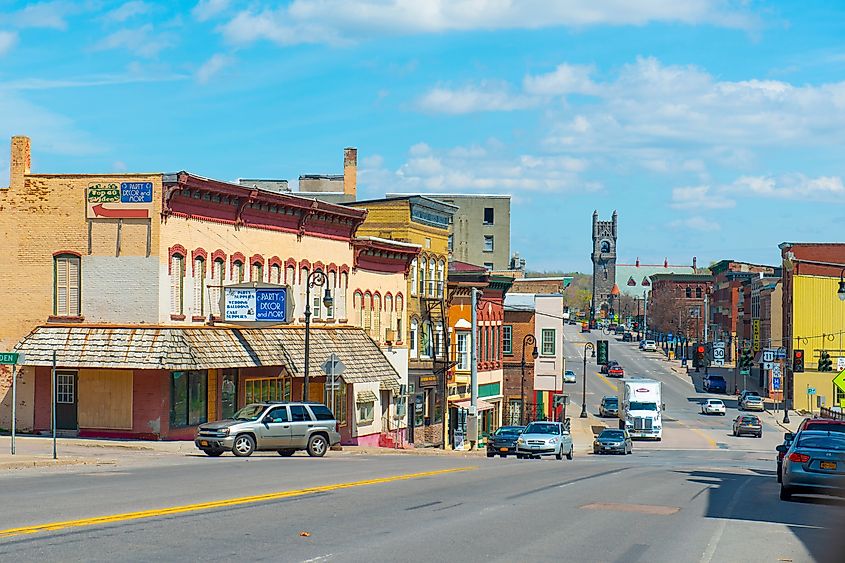
Sitting on the edge of the northern Adirondacks, just south of the Canadian border, the town of Malone has been described as one of the most historic in New York. One of its claims to fame is that it was the birthplace of President Rutherford Hayes' Vice President, William Almon Wheeler. Referred to as the "Star of the North," Malone's population today is estimated to be just over 11,000, per the US Census.
Malone's streets contain grand Victorian buildings that are a mixture of churches, homes, and government buildings. Renovations are currently taking place in the downtown area, beautifying Main Street and bringing in new businesses and community events.
Another interesting landmark in Malone is the Almanzo Wilder Homestead. This was the childhood home of author Laura Ingalls Wilder's husband and the setting of her book Farmer Boy. The homestead includes a furnished house from the 1860s, a pumphouse, barns, a hen house, and a replica of a one-room schoolhouse.
If you are visiting Malone in the winter, check out Titus Mountain, where day and night skiing and tubing take place. Seasonally, golfers enjoy the Malone Golf Club, a 36-hole championship course divided into two courses, East and West. It has been described as one of the finest golf courses in New York.
Lake George
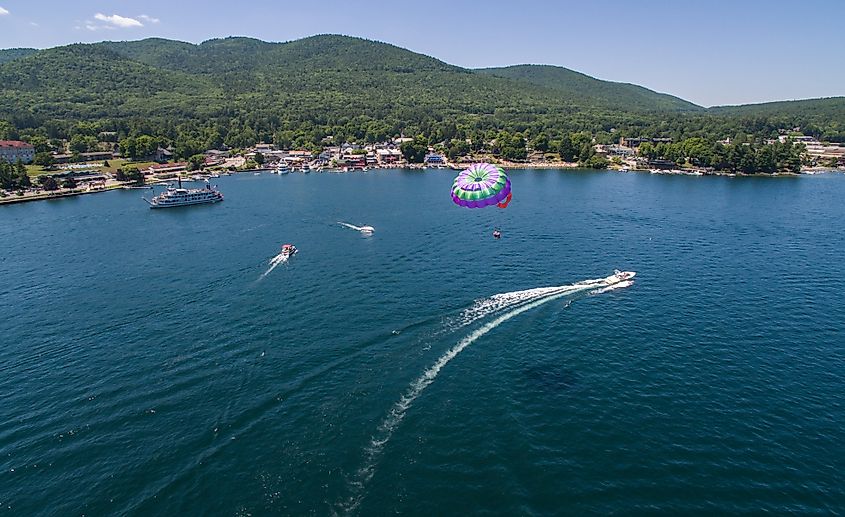
Lake George, in the southeastern area of the Adirondack Mountains, is home to around 3,500 residents. It is known as "the original vacation" after a guidebook to the Adirondacks in the 1860s referred to it as such. Although it is the smallest town in Warren County, Lake George attracts thousands of visitors each year.
Lake George was a strategic battleground during the French and Indian War. Fort William Henry, built in 1755, burned by the French in 1757 and rebuilt as a replica in 1953, can be toured today as a museum. Visitors can learn more about the French and Indian War and the Revolutionary War here.
If you visit Lake George in the fall, you could participate in the Lake George Historical Association Ghost Tours. The LGHA, which is housed in the historical Warren County Courthouse, built in 1845, also features exhibits such as the Women's Suffrage Exhibit, Native American Exhibits, and the Georgia O'Keefe and Alfred Steiglitz Exhibit Room.
When you are ready to hit the trails, Lake George has hundreds of miles to explore by hike or bike. During the winter months, skiers enjoy the peaks as well as the Nordic complex in nearby North Creek.
Keene
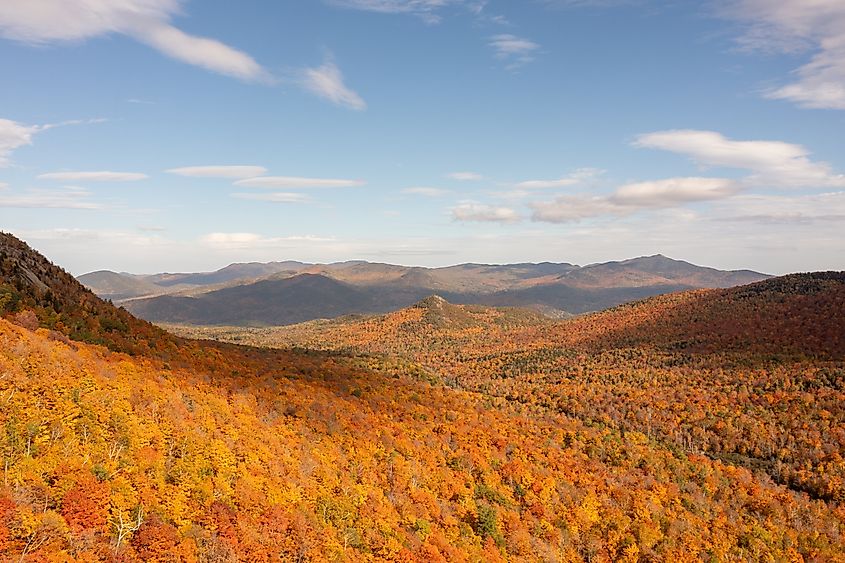
The historic town of Keene is home to just over 1,100 full-time residents today. The town, established in 1808, includes the hamlets of Keene, St. Huberts, and Keene Valley, and is part of the Adirondack Park. Fifteen of the 46 High Peaks can be found in Keene, including the highest mountain in New York, Mount Marcy.
Today, visitors can tour Holt House, one of the first areas settled in Keene, located at the intersection of Keene Valley and Keene on Marcy Field. It was built in the 1830s and is named for the Holt family who lived and farmed there for generations. Touring the house will give you an idea of what life during the 1830s was like for those who lived there.
Keene was known for producing iron and timber for export in the 1800s and 1900s. The Keene Valley Library hosts a collection of Keene Historic Photographs and postcards from 1880 to 1967, showing photos from this era as well as landmarks such as the Tahawus House, which burned in 1906.
The Norman Bridge is another famous historical landmark in Keene. This historic concrete bridge was built in 1913 by stone masons from Staten Island. It is only accessible through the Keene Valley Country Club and is listed on the National Registry of Historic Places.
Saratoga Springs
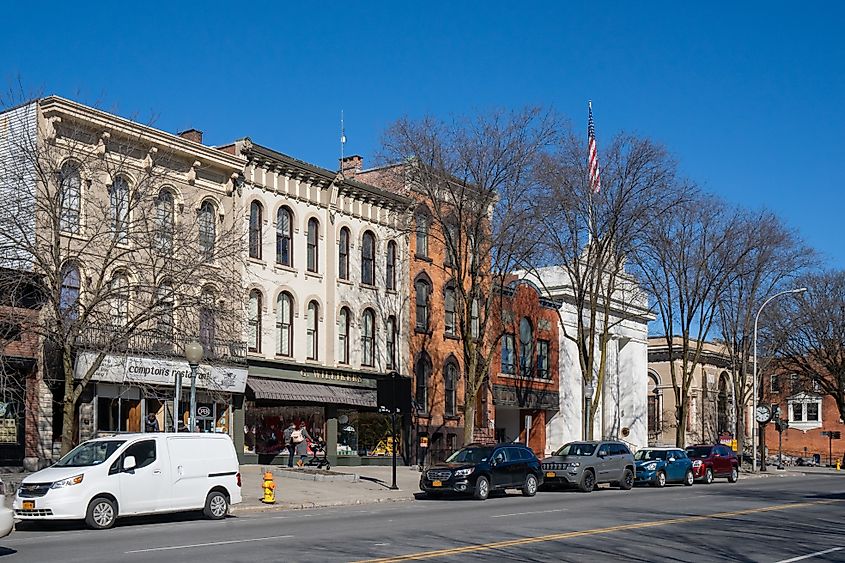
Saratoga Springs grew as a health resort and gambling center in the 1800s and 1900s. The first spa resort was created in 1802. Settlers were lured there by the springs, the only naturally carbonated mineral springs east of the Rocky Mountains. It was believed that these springs had healing powers. Today, visitors can tour the Saratoga Spa State Park, which offers a multitude of attractions, including mineral springs, spa houses, and a Performing Arts Center.
The Saratoga Race Course, constructed in 1863, is known as the oldest horse racetrack in the US and is still active today. During the racing season, visitors can enjoy guided walking tours of the course. Such tours last around 45 minutes and offer a glimpse into the race course's history.
The Canfield Casino, built to capitalize on the health and racing tourists flocking to the town, was built in 1870. It still stands today, in Congress Park in downtown Saratoga Springs, and can be booked for special events. The casino is also the site of the Saratoga Springs History Museum, which is available to tour.
Whether you appreciate the quiet serenity of Keene or the busier environment of Saratoga Springs, these old-world towns in the Adirondack Mountains will satisfy your desires. You will experience scenic beauty, small-town hospitality, and an abundance of landmarks with historical significance. These historic villages offer travelers a glimpse of what life was like long ago. Visiting any of these old-world towns will provide you with an unforgettable escape from the tedium of everyday life.











